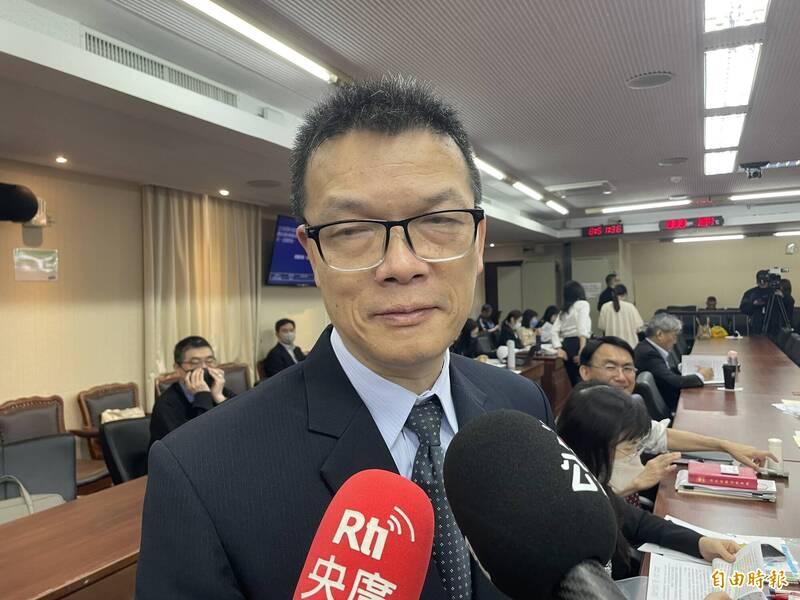The National Communications Commission (NCC) cannot approve the renewals of broadcast licenses as it lacks a quorum of members, NCC Acting Chairman Chen Chung-shu (陳崇樹) said today.
He made these remarks in a meeting of the Legislative Yuan’s Transportation Committee today.
The licenses of networks like Taiwan Television (TTV), China Television (CTV) and Chinese Television System (CTS) are to expire in June but they would not face service outages, Chen said.

Photo: Lin Chih-yi, Taipei Times
However, 37 operators would be affected in the first half of this year.
The license expirations are not the operators’ fault, Chen said, and the NCC has kept them informed of progress on their reviews, he added.
As there is no quorum, channel removals also cannot be reviewed by the NCC, so they must remain for the time being as well, Chen said.
Compared to the licensing of the air channels, the broadcast networks issue is more complex as there are also questions around their use of certain frequencies, he added.
Citing the Telecommunications Management Act (根據電信管理法) and discussions with the Ministry of Digital Affairs, Chen said authorities must first terminate a radio frequency user’s registration prior to taking a channel off air.
Chinese Nationalist Party (KMT) Legislator Hung Mong-kai (洪孟楷) asked why the Executive Yuan had not submitted a list of NCC nominees to the Legislative Yuan.
In response, Chen said that there had been a list of nominees submitted to the Legislative Yuan, although he added he was unsure if a new list would be submitted in the future.
Citing regulations, he said that the right to nominate individuals to the NCC lies solely with the premier and the NCC plays no role in the process.
Democratic Progressive Party (DPP) Legislator Chen Su-yueh (陳素月) said the Executive Yuan submitted a list of nominees on April 30 last year but the KMT-controlled Procedure Committee blocked it.
The issue of the NCC’s budget also remains unsolved and it will run out of operational funds in April, Chen Chung-shu said.
Although the NCC is currently negotiating with landlords about postponing rent payments, that would only be able to last until September, Chen added.
Once the water and electricity are turned off, “information systems” that serve the public would also go offline, he said.

The Coast Guard Administration (CGA) yesterday said it had deployed patrol vessels to expel a China Coast Guard ship and a Chinese fishing boat near Pratas Island (Dongsha Island, 東沙群島) in the South China Sea. The China Coast Guard vessel was 28 nautical miles (52km) northeast of Pratas at 6:15am on Thursday, approaching the island’s restricted waters, which extend 24 nautical miles from its shoreline, the CGA’s Dongsha-Nansha Branch said in a statement. The Tainan, a 2,000-tonne cutter, was deployed by the CGA to shadow the Chinese ship, which left the area at 2:39pm on Friday, the statement said. At 6:31pm on Friday,

The Chinese People’s Liberation Army Navy’s (PLAN) third aircraft carrier, the Fujian, would pose a steep challenge to Taiwan’s ability to defend itself against a full-scale invasion, a defense expert said yesterday. Institute of National Defense and Security Research analyst Chieh Chung (揭仲) made the comment hours after the PLAN confirmed the carrier recently passed through the Taiwan Strait to conduct “scientific research tests and training missions” in the South China Sea. China has two carriers in operation — the Liaoning and the Shandong — with the Fujian undergoing sea trials. Although the PLAN needs time to train the Fujian’s air wing and

The American Institute in Taiwan (AIT) put Taiwan in danger, Ma Ying-jeou Foundation director Hsiao Hsu-tsen (蕭旭岑) said yesterday, hours after the de facto US embassy said that Beijing had misinterpreted World War II-era documents to isolate Taiwan. The AIT’s comments harmed the Republic of China’s (ROC) national interests and contradicted a part of the “six assurances” stipulating that the US would not change its official position on Taiwan’s sovereignty, Hsiao said. The “six assurances,” which were given by then-US president Ronald Reagan to Taiwan in 1982, say that Washington would not set a date for ending arm sales to Taiwan, consult

A Taiwanese academic yesterday said that Chinese Ambassador to Denmark Wang Xuefeng (王雪峰) disrespected Denmark and Japan when he earlier this year allegedly asked Japan’s embassy to make Taiwan’s representatives leave an event in Copenhagen. The Danish-language Berlingske on Sunday reported the incident in an article with the headline “The emperor’s birthday ended in drama in Copenhagen: More conflict may be on the way between Denmark and China.” It said that on Feb. 26, the Japanese embassy in Denmark held an event for Japanese Emperor Naruhito’s birthday, with about 200 guests in attendance, including representatives from Taiwan. After addressing the Japanese hosts, Wang